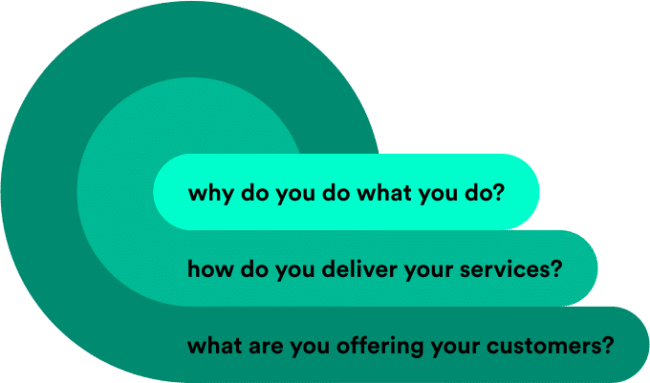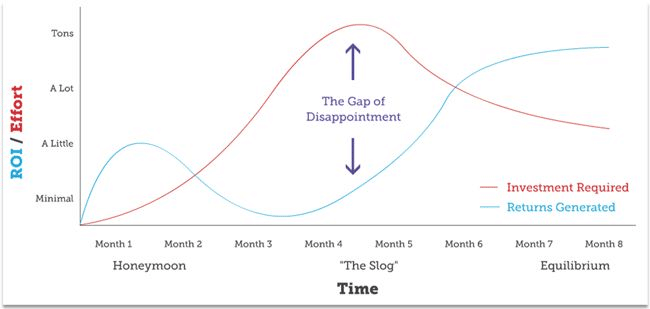Need help writing marketing project briefs and identifying your most valuable marketing channels? Schedule a free marketing evaluation with our team–it’s fast, free, and we get it right.

Over the better part of a decade, we’ve seen over 6,500 businesses and over $250 million in digital marketing spend come through Credo. Suffice it to say, I’ve read a couple (thousand) or so marketing project briefs over that time—and written many myself.
I learned a lot about the dos and don’t of growing Credo along the way. But more importantly, I learned how our most successful clients and partner agencies run, manage, and scale their brands.
What’s one of the top lessons? That many businesses—funny as it may sound—have no idea how to explain what they are looking to accomplish by hiring a digital agency. That’s where a project brief makes all the difference.
Table of Contents
What’s a Project Brief? Short Version
A digital marketing brief is an easy-to-digest document that provides an overview of your entire project. The brief should house all project information for your team and key stakeholders, which includes:
- A quick, concise summary of the project scope;
- Type of content—with examples, if possible;
- Marketing channels you plan to use;
- Key dates and deadlines;
- Target audience and customer persona(s);
- Key metrics and KPIs;
- Final deliverables.
Different from a project plan—which lays out how a project gets done—a project brief defines the who, what, when, where, and why of the project. Learn more about what separates these equally valuable documents here:
Typical Problems With Project Briefs
The main problem—to be entirely honest—is that most people don’t have a strategy or any kind of analytical approach to writing a project brief in the first place. Often times they aren’t able to describe the project scope itself without going off on a whole lot of tangents. And an equal amount of disconnected asides.
Here’s an example of what I mean:
We recently received an inquiry from a potential client. In that inquiry, they were wholly unable to describe their project. At least not in a way that allowed us to solve their painpoint with a specific plan of action.
The prompt asks: “Describe your project. What problem are you trying to solve?”:
In need of online marketing service.
That’s it. Now, don’t get me wrong—we are more than glad to lead the conversation from there. But that’s the kind of unprepardness that can leads to you overpaying for bloated service packages that you don’t actually need.
So, after a 20-minute conversation with this potential client, we came up with this:
“[Client] is a [location] based [type] company. They have been working with a local SEO and PPC agency but are looking to move away from them to get better work and to work with someone who cares about their brand—not just another contract. They’ve been working on a new website with their current agency, but are open to having their new agency take that ball and run with it instead.
They’re looking for a long term engagement with a digital marketing agency who understands local and national lead generation. They want to grow their organic traffic (via content marketing—top priority) and paid acquisition channels. The agency needs to help them monitor and grow and manage their brand awareness online, and who is open to working together with their team. The team is very involved with the data and want to stay involved.“
There’s a Disconnect, Somewhere
In all cases, I give people the benefit of the doubt. But, you know, there’s some kind of unwritten these days that people tend not to provide enough information about themselves—and do not explain themselves online. The old bait and switch. This is one reason Credo has a high-touch, personalized approach to matching agencies.
Research also shows that lead generation forms are really a balance between user intent and how your business qualifies leads—and then follows up with them.
Quite simply, that’s a challenge for everyone—Credo most definitely included.
However, one of Credo’s missions is to help marketers think deeper about their brands interaction with their clients. I truly believe the client/agency relationship flourishes when it’s focuses on the metrics that matter (revenue and customers). New backlinks or lower CPC (cost per acquisition) are certainly important metrics—but not everything!
While those two can matter as directional metrics, they are not the be-all-and-end-all. Too often, marketers talk about things that don’t matter. Actually, every part of a business does this, e.g. engineers talking about “CRON jobs” and seeing executives roll their eyes. It’s just not helpful to them in getting buy-in to grow the business.
Project briefs fix this by keeping all stakeholders on the same page—pun intended. Everyone has the same document, outlining the same key points noted above, and are working towards the same goal.
How to Write Digital Marketing Briefs
Here’s what I’ve learned over the past years.
First and foremost, keep it simple—for everyone’s sake!
Beyond that, you need to:
- Not be prescriptive, but rather consultative;
- Explain the kind of business you are and how you make money;
- Define your business goals and set measurable milestones;
- Know what team you have in place and what that means for who you should hire;
- Have an initial idea of the channels you want to invest in and the metrics you’ll track.
That’s a lot. As a business owner, you likely just don’t have the time to deep dive into this process. That leads to convoluted, over-wordy, and confusing briefs that set you back rather than propel your project ahead.
I’ve got you covered. Just use this marketing brief generator instead. Think of it as and outline to help you brainstorm through all of the variables above. Then, you come away with something tangible you can send to an agency—or bring to our team to kickstart the right introductions for your needs.
-> Generate your brief with the marketing brief generator.
My Best Advice
After nine years of digital matchmacking and writing—or reviewing—more briefs than I can count, here’s my best advice. For any brand looking to work with a digital marketing agency, consider these my helpful hot takes:
Do not be prescriptive about what you need—be descriptive.
Many brands try to say specifically what they want. That’s great but if the person trying to find services is not a marketer themselves—or is hunting for someone to fill a gap in their own skillset—then being prescriptive about what you need (instead of engaging in a consultative sales process) is not going to help you hire the right team.
Instead of being prescriptive, do what any good manager does: ask questions, set goals, and be descriptive about your specific needs. Then, unleash the expert(s) to set the strategy straight.
Explain the kind of business you are
When you’re inquiring to an agency and explaining what you need, one of the first things an agency should ask you is what kind of business you are. Start with a top-level view—following this structure:

The kind of business you are determines the types of strategies you need. For example, the marketing channels that you use to grow your business. Consider a location-based business. They need specific strategies focused on local searches and specific on-page elements for SEO. In contrast, a large ecommerce website usually needs to be more concerned about duplicate content and crawl budget.
My point is this: you need to be clear with the potential agency about what kind of business you are, who you serve, and how you make money. Remember, the five W’s form the backbone of any well-written project brief.
Here’s a clear, to-the-point example of a project brief summary:
We are a home decor ecommerce website that sells direct to consumer and to interior designers. Our goal is to grow the B2B side of our business by targeting designers to our email list. We sell wholesale to interior designers, which makes up approximately 20% of our business right now.
Define your business goals
Did I mention you need to be extra judicious about clarity? Indeed—you need to be clear on what you are looking to accomplish by engaging with a marketing provider before you hire one. That only makes sense.
What you want to accomplish should map back to your business revenue goals—not a specific thing that an agency would do for you. You want to hire for results, not for output. Many ineffective people and organizations do a lot of things, but they never seem to accomplish anything of tangible value that drives real revenue.
You would not not hire a full time employee without a defined role and set goals tied directly to your bottom line. Likewise, you should not hire an agency without clear defined goals for what you want to accomplish.
Of couse, this is tricky if you don’t even know the questions you should be ask in the first place. If you don’t know what to ask, you can’t figure out if the agency can do what you need in order to hit your goals.
Contrary to what many might assume, us marketers are not hucksters. Most agencies genuinely want to do good work and want to help you grow your business. Reputation is everything in this industry. Whether they have the skills to do it is another story—but most are not out to just make a quick buck off of you.
If you’re not sure about an agencies initial introduction, let the numbers do the talking. Press them to show you—based on research and data—how what they are proposing to get you where you want to go.
Know what team you have in place
Once you know the team you have, you can look for the right kind of provider.
At Credo, we help businesses define the type of provider they need. Many think that they want a consultant, but when we dig into their business and team, I often discover their scope of work requires an agency.
The team you have in place determines whether you need strategy or services. And that then determines the type of provider you need to hire.
If you have a team in place but do not have a set strategy, then often the right answer is to consult with someone who undertsands the intracices of this process. Someone who only focuses on work on outlining what needs to get done, where the opportunities are, and then work with the team to put that strategy into action.
I call this telling the group where to run. If you don’t have a maestro around, we specialize in that—too.
If you have a strategy but no team—or neither of these, then you probably need an agency. Not a solo consultant. While a solo consultant can usually help you with the strategy side, most lack the scale to be able to implement strategy on a larger scale.
This is especially true in SEO and may be less true in areas like PPC or Facebook Ads. Why? Because those have fewer moving parts. Though, they do often still require landing pages and analytics and optimizations along the way to bring down that CPC, ROI and ROAS.
Before saying “We want a consultant”, look at the team in place and your true needs.
Here’s one way to decide what kind of team you need:
- Strategy and directing a team where to go = consultant;
- Strategy and/or execution = agency.
Define the channels you think you need
No business—except perhaps the earliest early stage startups—has ever done no marketing and succeded. As such, decide what marketing channels you want to invest in based on where your competitors market. Or, after speaking with a business owner who has seen good success with your channel of choice.
I encourage you to enter any discussion with potential digital providers with a plan. At the same time, be open to listening to the expert and taking their advice on the direction in which they would take your business.
Just as you wouldn’t tell your accountant how to do your annual federal taxes, I encourage you to not try to tell an marketing agency how to market. If they have the requisite experience (if they don’t—stop speaking with them) and good references, then listen to their advice the same way that you would listen to your accountant.
You might not have penalties and fees from the government like you could if you don’t listen to your accountant, but if you don’t listen to an expert’s input then you’re risking your business not growing like you would like.
Let an expert guide you
Brands looking to hire and speak with an agency also need to understand marketing takes times. At least three months, in most cases. If you understand the “Gap of Disappointment” is entirely normal, then you won’t be miffed when the agency lays out plan over a longer period of time than you expect.

This goes back to most people in the world being trustworthy. An agency who puts together a shortened proposal so that they can get a longer contract—and therefore doesn’t get results—will not stay in business very long.
If this is a concern of yours, we can assist you with our Porter Service. This is a paid hour of consulting with me (John, founder and veteran digital marketer) to help you put together your strategy to hire the right agency.
More Tools To Help Write Your Marketing Brief
To help you send a better description to agencies you are interested in working with, I’ve created a matrix embedded below that will give you a marketing brief. You can copy and paste and fit it to your needs.
Click the button below to check out the tool! I hope it helps you as much as it has helped us.

